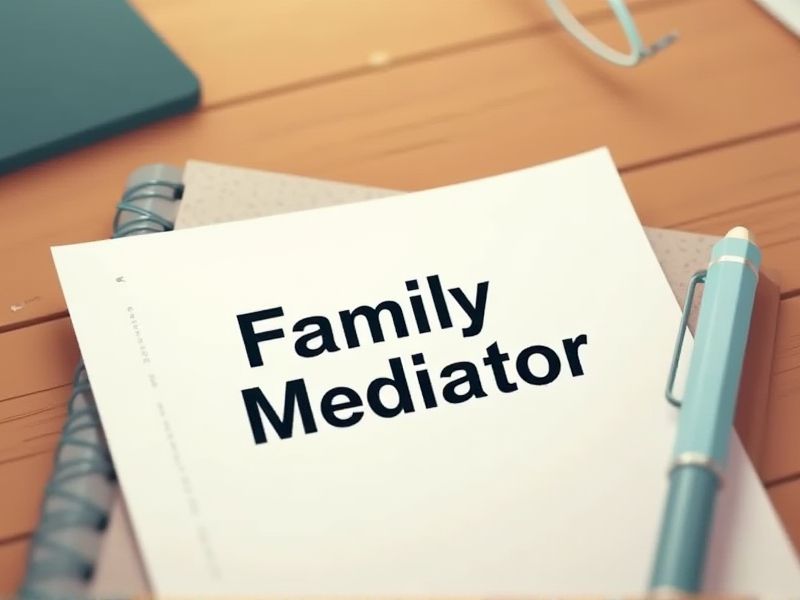
Family mediators play a crucial role in resolving disputes, often requiring them to navigate complex emotional and legal dynamics. Proper certifications ensure that mediators possess the necessary skills and knowledge to handle sensitive family matters effectively. Certifications also enhance a mediator's credibility and trustworthiness, which is vital when dealing with personal and intimate conflicts. Below are some key certifications that may be required for a Family Mediator.
Certified Family Mediator (CFM)
The increasing complexity of family disputes often requires specialized mediation skills, which a Certified Family Mediator possesses. A CFM brings structured techniques and legal knowledge to navigate emotionally charged situations effectively. Having a certified professional can lead to higher resolution rates, reducing the need for costly and lengthy court proceedings. Certification ensures that the mediator adheres to state regulations and ethical standards, fostering trust among disputing parties.
Family Dispute Resolution Certification
Family Dispute Resolution Certification ensures that a family mediator possesses the necessary skills to handle sensitive family matters effectively. Mediators with this certification are trained in conflict resolution techniques, which increases the likelihood of successful mediation outcomes. Courts often require certified mediators in family disputes, as it aligns with legal standards and best practices. Families benefit from certified mediators as they are typically more adept at navigating complex family dynamics and legal considerations.
Mediation Training Certification (Association for Conflict Resolution)
Mediation Training Certification from the Association for Conflict Resolution ensures family mediators meet established professional standards, fostering trust with clients. Proper certification equips mediators with essential skills to navigate complex family dynamics, enhancing conflict resolution effectiveness. Accredited training programs provide mediators with the latest strategies and techniques, ensuring they stay current with evolving best practices. Certified mediators are often preferred in legal settings, as their credentials support credibility and competence in facilitating fair outcomes.
Advanced Family Mediation Certification
Obtaining an Advanced Family Mediation Certification enables family mediators to handle complex familial disputes more effectively, which increases their credibility and client trust. Specialized certification equips mediators with comprehensive skills and knowledge that address a wide range of family dynamics, ensuring more amicable resolutions. A certified mediator often has access to a broader network of professional resources and continuing education, enhancing their ability to provide up-to-date mediation practices. Many states and organizations require or prefer certification to ensure mediators adhere to high standards of practice, making it a crucial credential for career advancement.
Certified Professional Mediator (CPM)
Increased family disputes lead to a demand for structured conflict resolution, making Certified Professional Mediators essential in family mediation. Advanced training of a CPM ensures skilled facilitation, helping families reach amicable agreements effectively. Professional certification provides a standard of competence, fostering trust among clients. Legal complexities in family mediation call for a mediator with certification to navigate sensitive issues proficiently.
Legal Mediation Certification
Obtaining a Legal Mediation Certification equips family mediators with the necessary skills and knowledge to effectively handle conflicts and disputes, ensuring they follow legal standards. Certified mediators are recognized as credible professionals, which increases trust from clients and can lead to more successful mediations. The certification process often includes training in communication and negotiation tactics, which are critical when addressing sensitive family issues. Legal Mediation Certification also keeps mediators updated on changes in family law, which is essential for providing relevant and informed guidance.
Conflict Resolution and Negotiation Skills Certificate
Possessing a Conflict Resolution and Negotiation Skills Certificate equips a family mediator with verified techniques to facilitate discussions and manage emotions effectively. This credential provides a structured framework for navigating complex family dynamics and disputes. Certified mediators are seen as more credible and trustworthy, encouraging parties in conflict to engage openly. The certification ensures that mediators adhere to ethical and professional standards, fostering a safe environment for all participants.
Family Counseling Certification
Obtaining a Family Counseling Certification equips family mediators with essential skills to effectively manage emotional dynamics during disputes. Without this certification, mediators might lack the necessary understanding of family systems and relational patterns, potentially hindering conflict resolution. The certification ensures mediators are trained in culturally sensitive and ethical practices crucial for diverse family situations. With these qualifications, mediators are better prepared to facilitate dialogues that lead to sustainable resolutions.
Trauma-Informed Mediation Certification
Family mediators often encounter sensitive situations where clients are dealing with past trauma, which can significantly impact the mediation process. Trauma-informed mediation certification equips mediators with the skills to recognize and address these dynamics, promoting a safer and more supportive environment. Without such training, mediators may inadvertently exacerbate emotional distress, hindering conflict resolution. Certified mediators are better prepared to facilitate effective communication and understanding, leading to more sustainable outcomes for families.
Certified Judicial Mediator Certification
Certified Judicial Mediator Certification ensures a standardized level of expertise and competence for family mediators, enhancing the quality of mediation outcomes. The certification provides structured training and knowledge essential for addressing the often complex emotional and legal intricacies present in family disputes. It instills trust among participants in the mediation process, knowing that the mediator possesses verified skills and understanding of family law. Accredited certification can lead to more consistent and fair resolutions, potentially reducing the burden on court systems by resolving disputes outside litigation.
Summary
When you acquire certifications as a Family Mediator, your credibility and professional trust significantly increase. Clients often seek professionals with recognized credentials, which can lead to a larger clientele. Certified mediators generally exhibit enhanced skills and knowledge, improving conflict resolution outcomes. This ultimately results in higher satisfaction rates and potentially more referrals for your services.
